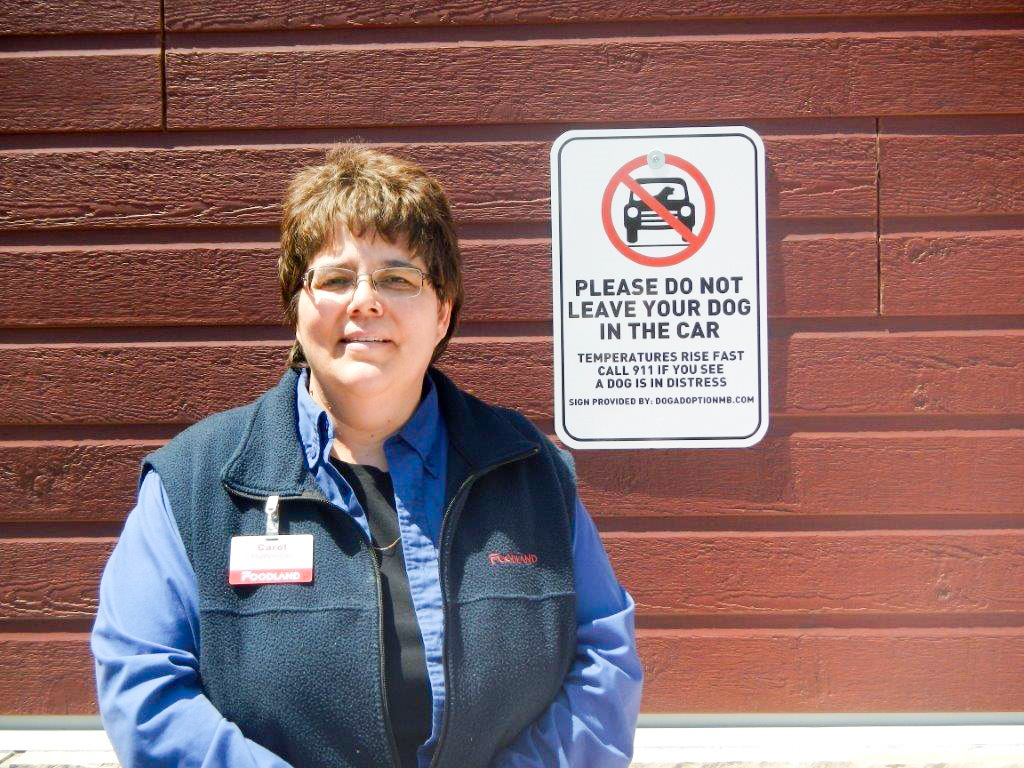MANITOULIN— Every summer, in Canada and throughout the world, the SPCA and other humane groups as well as fire departments and police receive thousands of calls about dogs left in vehicles on hot days. Many of those dogs suffer brain damage, exhaustion or kidney failure from the heat and many of them die. According to the group People for the Ethical Treatment of Animals (PETA), the temperature inside a vehicle can soar within minutes, and leaving the windows of the car, truck or van open a crack or a lot does not really help—and neither does parking in the shade.
Here on Manitoulin, Julie McDermid, dog lover extraordinaire, is doing her part to educate Islanders and visitors about this warm weather problem.
“I work with Manitoulin Pets United,” Ms. McDermid told The Expositor, “and our group has been fortunate to be able to connect with other rescues and the individuals across Canada who help people reunite lost pets. One of these people was Lenora Chapman Bisson who has close ties to Manitoulin but calls Manitoba home. She has been a wealth of information and a support system for our group. It was through her that I connected with Barry Piasta.”
Mr. Piasta, who also lives in Manitoba, works in animal rescue. He is the creator of Dog Adoption MB and started a sign campaign to remind people not to leave their dogs in a vehicle in warm or hot weather. As Ms. McDermid explained, Mr. Piasta works with a small company also dedicated to animal rescue. “They are willing to produce the signs in small quantities and still keep the cost low but the quality very high. Barry tries to have fundraisers to cover the cost of each sign that goes up if a business does not pay. His goal is to get the signs across Manitoba.”
Mr. Piasta has put 150 signs up across that province and the venture has now spread to Ontario and Minnesota with interest expressed in Saskatchewan and British Columbia. “Julie has been a great help in getting the signs out into Ontario,” Mr. Piasta said as he added that yearly there are reports of dogs that have died or have serious neurological irreversible injury because they are left in hot cars.
Ms. McDermid’s goal was to get the signs up across the Island—and she did. She purchased 20 signs and all 20 have been bought and posted by businesses and municipalities across Manitoulin with Island Foodland, Home Hardware and Williamson Hardware, all in Mindemoya, first off the mark. Others include the Township of Tehkummah, the Township of Billings, Andy’s store in Wikwemikong with another to be placed elsewhere on the reserve, Turners of Little Current, Loco Beanz and Cedar Chalet in Manitowaning and Anchor Inn in Little Current. Ms. McDermid was also successful in getting a sign placed at Wolfies Store in Birch Island and Quality Flowers and Gifts in Elliot Lake. It is noteworthy that in the Home Hardware and Williamsons Hardware stores in Mindemoya and Turners of Little Current dogs are allowed.
There are different signs available to remind people to keep their pets out of the vehicles when the weather is warm, but Ms. McDermid went with the signs made in Manitoba for a reason. “There are a lot of signs out there,” she said, “but the ones that seem to be actually effective are these ones that ask you to call 911 if you see a dog in distress. I believe most people on Manitoulin Island who witness a dog left in a hot car will try other means prior to calling 911 unless the animal is in extreme danger. I myself have sent someone into the business to have the vehicle make and plate number and the reason announced. I have found that people respond very quickly. Some are annoyed and some really just did not realize how quickly the temperature had risen even with the windows down. Regardless of the media exposure this real concern has had, dogs are still being left in hot cars daily across the country. These signs produced over 4,000 calls last year. They are effective and they do save lives. Either way we cannot let this keep happening. And I believe, through the awareness brought with these signs on display and the proper education made available to pet owners, we can someday call this a thing of the past.”
Ms. McDermid is right about the media exposure. Recent articles in both print and social media have shown a policeman who made a woman sit in the hot car after her dog had been rescued to educate her about the seriousness of the situation, and a policeman in one instance and a veterinarian in another who volunteered to sit in a hot vehicle for several minutes to show the public how fast a person, or especially an animal, can get very, very uncomfortable. More education is obviously needed. For example, the police and SPCA in Kewlona, British Columbia held a news conference to talk about the dangers of leaving animals in vehicles. While the teach-in was going on, five complaints about this very subject came in to the local animal shelter. An RCMP constable in attendance placed stuffed dogs in two cars with an internal temperature of 26°C. Within 10 minutes, the car in the shade was recording a temperature of 34°C while the car in the sun showed 45°C.
The Ontario SPCA also has a program to help save the lives of pets. Owners are encouraged to go to nohotpets.ca to take an online pledge and will receive a decal for vehicle windows saying, “if you see a pet in a hot vehicle, call your local police service.”
The public is also reminded that asphalt and concrete can get extremely hot and can easily burn the pads on a dog’s feet. When walking your dog in hot weather, it is advised that you walk on grass.
If any business would like to purchase the dog signs, contact Ms. McDermid at juliemcdermid@amtelecom.net or call 705-377-4800.




